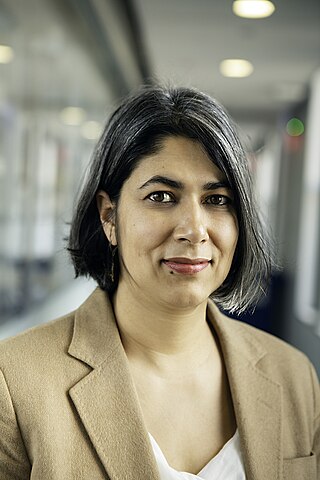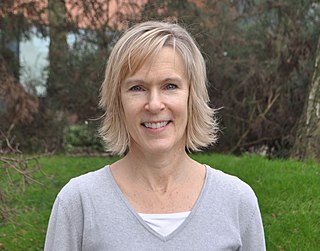Related Research Articles

Raymond Urgel Lemieux, CC, AOE, FRS was a Canadian organic chemist, who pioneered many discoveries in the field of chemistry, his first and most famous being the synthesis of sucrose. His contributions include the discovery of the anomeric effect and the development of general methodologies for the synthesis of saccharides still employed in the area of carbohydrate chemistry. He was a fellow of the Royal Society of Canada and the Royal Society (England), and a recipient of the prestigious Albert Einstein World Award of Science and Wolf Prize in Chemistry.
Jean M.J. Fréchet is a French-American chemist and professor emeritus at the University of California, Berkeley. He is best known for his work on polymers including polymer-supported chemistry, chemically amplified photoresists, dendrimers, macroporous separation media, and polymers for therapeutics. Ranked among the top 10 chemists in 2021, he has authored nearly 900 scientific paper and 200 patents including 96 US patents. His research areas include organic synthesis and polymer chemistry applied to nanoscience and nanotechnology with emphasis on the design, fundamental understanding, synthesis, and applications of functional macromolecules.

Chi-Huey Wong is a Taiwanese-American biochemist. He is currently the Scripps Family Chair Professor at the Scripps Research Institute, California in the department of chemistry. He is a member of the United States National Academy of Sciences, as awarded the 2014 Wolf Prize in Chemistry and 2015 RSC Robert Robinson Award. Wong is also the holder of more than 100 patents and publisher of more 700 scholarly academic research papers under his name.

Carolyn Ruth Bertozzi is an American chemist and Nobel laureate, known for her wide-ranging work spanning both chemistry and biology. She coined the term "bioorthogonal chemistry" for chemical reactions compatible with living systems. Her recent efforts include synthesis of chemical tools to study cell surface sugars called glycans and how they affect diseases such as cancer, inflammation, and viral infections like COVID-19. At Stanford University, she holds the Anne T. and Robert M. Bass Professorship in the School of Humanities and Sciences. Bertozzi is also an Investigator at the Howard Hughes Medical Institute (HHMI) and is the former director of the Molecular Foundry, a nanoscience research center at Lawrence Berkeley National Laboratory.

Lara K. Mahal is an American chemist who is the Canada Excellence Research Chair in Glycomics at the University of Alberta in Edmonton, Alberta, Canada. She is also a Professor of Chemistry at the University of Alberta. She is notable both for her pioneering work establishing lectin microarrays as a new technology for glycomics, her work on miRNA regulation of glycosylation and her graduate work with Carolyn R. Bertozzi on unnatural carbohydrate incorporation. Work in her laboratory focuses on understanding the role of carbohydrates in human health using systems- and chemical biology-based approaches
Glycopeptides are peptides that contain carbohydrate moieties (glycans) covalently attached to the side chains of the amino acid residues that constitute the peptide.
Laura Lee Kiessling is an American chemist and the Novartis Professor of Chemistry at the Massachusetts Institute of Technology. Kiessling's research focuses on elucidating and exploiting interactions on the cell surface, especially those mediated by proteins binding to carbohydrates. Multivalent protein-carbohydrate interactions play roles in cell-cell recognition and signal transduction. Understanding and manipulating these interactions provides tools to study biological processes and design therapeutic treatments. Kiessling's interdisciplinary research combines organic synthesis, polymer chemistry, structural biology, and molecular and cell biology.
Linda Carol Hsieh-Wilson is an American chemist and the Milton and Rosalind Chang Professor of Chemistry at the California Institute of Technology. She is known for her work in chemical neurobiology on understanding the structure and function of carbohydrates in the nervous system. Her studies have revealed critical roles for carbohydrates and protein glycosylation in fundamental processes ranging from cellular metabolism to memory storage. She is a member of the American Academy of Arts and Sciences and was elected to the National Academy of Sciences in 2022.
Cynthia Larive is an American scientist and academic administrator serving as the chancellor of University of California, Santa Cruz. Larive's research focuses on nuclear magnetic resonance spectroscopy (NMR) and mass spectrometry. She was previously a professor of chemistry and provost and executive vice chancellor at the University of California, Riverside. She is a fellow of AAAS, IUPAC and ACS, associate editor for the ACS journal Analytical Chemistry and editor of the Analytical Sciences Digital Library.
Peter Wipf is a distinguished university professor of chemistry at the University of Pittsburgh. His research interests focus on the total synthesis of natural products, the discovery of new transformations of strained molecules, and the development of new pharmaceuticals. He is a Fellow of the Royal Society of Chemistry (RSC), the American Association for the Advancement of Science (AAAS), and the American Chemical Society (ACS).
Mildred May Gostling, also published under her married name Mildred Mills, was an English chemist who completed research in carbohydrate chemistry. She was one of the nineteen signatories on a letter from professional female chemists to the Chemical Society requesting that women be accepted as Fellows to the Society.

Malika Jeffries-EL is an American chemist and professor of chemistry at Boston University studying organic semiconductors. Specifically, her research focuses on developing organic semiconductors that take advantage of the processing power of polymers and the electronic properties of semiconductors to create innovative electronic devices. She was elected as a Fellow of the American Chemical Society in 2018.
Bradley Lether Pentelute is currently a professor of chemistry at the Massachusetts Institute of Technology (MIT). His research program lies at the intersection of chemistry and biology and develops bioconjugation strategies, cytosolic delivery platforms, and rapid flow synthesis technologies to optimize the production, achieve site-specific modification, enhance stability, and modulate function of a variety of bioactive agents. His laboratory successfully modified proteins via cysteine-containing “pi-clamps” made up of a short sequence of amino acids, and delivered large biomolecules, such as various proteins and drugs, into cells via the anthrax delivery vehicle. Pentelute has also made several key contributions to automated synthesis technologies in flow. These advances includes the invention of the world's fastest polypeptide synthesizer. This system is able to form amide bonds at a more efficient rate than standard commercial equipment and has helped in the process of understanding protein folding and its mechanisms. This automated flow technology was recently used to achieve total chemical synthesis of protein chains up to 164 amino acids in length that retained the structure and function of native variants obtained by recombinant expression. The primary goal of his endeavor is to use these processes to create designer biologics that can be used to treat diseases and solve the manufacturing problem for on-demand personalized therapies, such as cancer vaccines.

Sara E. Skrabalak is a James H. Rudy Professor at Indiana University. Skrabalak leads a research group in the department of chemistry which focuses on the development of new nanomaterials. She has an adjunct appointment in the department of intelligent systems engineering.
Balaram Mukhopadhyay is an Indian Bengali carbohydrate chemist and a professor at the department of chemical sciences of the Indian Institute of Science Education and Research, Kolkata. Balaram is mainly known for his work in the field of synthetic carbohydrate chemistry. He was given the Excellence in Carbohydrate Research Award by the Association of Carbohydrate Chemists and Technologists India (ACCTI) in 2018 for his contribution towards field of carbohydrates.

Heather D. Maynard is the Dr Myung Ki Hong Professor in Polymer Science at the University of California, Los Angeles. She works on protein-polymer conjugates and polymeric drugs. Maynard is a Fellow of the Royal Society of Chemistry and the American Association for the Advancement of Science.

Kristi Lynn Kiick is the Blue and Gold Distinguished Professor of Materials Science and Engineering at the University of Delaware. She studies polymers, biomaterials and hydrogels for drug delivery and regenerative medicine. She is a Fellow of the American Chemical Society, the American Institute for Medical and Biological Engineering, and of the National Academy of Inventors. She served for nearly eight years as the deputy dean of the college of engineering at the University of Delaware.
Ten Feizi is a Turkish Cypriot/British molecular biologist who is Professor and Director of the Glycosciences Laboratory at Imperial College London. Her research considers the structure and function of glycans. She was awarded the Society for Glycobiology Rosalind Kornfeld award in 2014. She was also awarded the Fellowship of the Academy of Medical Sciences in 2021.
Barbara Imperiali is a Professor of Biology and Chemistry at Massachusetts Institute of Technology and Affiliate Member of the Broad Institute. She is an elected member of the National Academy of Sciences and a Fellow of the Royal Society of Chemistry.
Theresa Lynn Windus is an American chemist who is a distinguished professor at Iowa State University and the Ames Laboratory. Her research involves the development and use of high performance computational chemistry methods to tackle environmental challenges, including the development of new catalysts and renewable energy sources. She was elected a Fellow of the American Chemical Society in 2020.
References
- ↑ Pohl, Nicola L (1991). Disease as a metaphor for sin and guilt in the works of Flannery O'Connor and Walker Percy (Thesis). OCLC 76976445.
- 1 2 "Inside Iowa State". archive.inside.iastate.edu. Retrieved 2020-11-26.
- 1 2 Carmen Drahl (2012-08-20). "Nicola Pohl". Chemical & Engineering News Archive. 90 (34): 46. doi: 10.1021/cen-09034-cover8 . ISSN 0009-2347.
- 1 2 3 4 "Nicola Pohl, PhD". www.nanovaccine.iastate.edu. Retrieved 2020-11-26.
- 1 2 "Nicola Pohl | Fulbright Scholar Program". www.cies.org. Retrieved 2020-11-26.
- ↑ "News Expert Profile". News at IU. Retrieved 2020-11-26.
- ↑ "Morris, Norma Frances, (born 17 April 1935), Research Fellow, University College London, since 1995", Who's Who, Oxford University Press, 2007-12-01, doi:10.1093/ww/9780199540884.013.28189 , retrieved 2020-11-26
- ↑ "Bridging the Gap for Biotherapeutics Development: Joining Automated Oligosaccharide to Automated Peptide Synthesis" (PDF). SVACS. 2018.
- ↑ "AAAS Announces Leading Scientists Elected as 2020 Fellows | American Association for the Advancement of Science". www.aaas.org. Retrieved 2020-11-26.